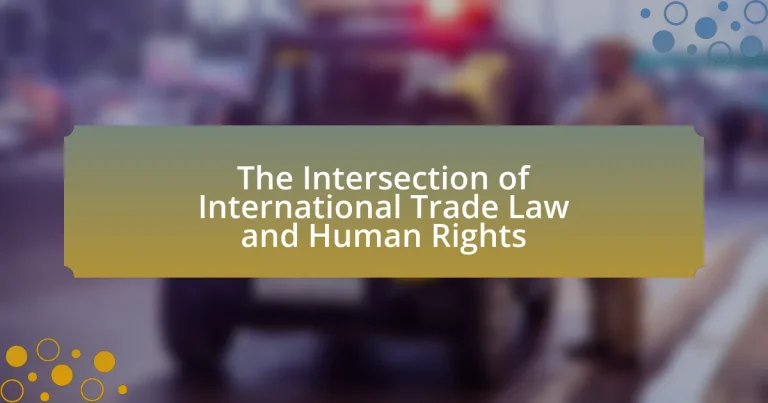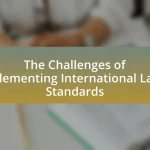The article examines the intersection of international trade law and human rights, highlighting how trade agreements can influence human rights standards and protections. It discusses the interaction between trade practices and human rights, emphasizing the importance of incorporating labor rights and environmental protections into trade agreements. Key principles of international trade law, such as non-discrimination and transparency, are outlined alongside fundamental human rights concepts like universality and equality. The article also addresses the challenges and legal conflicts that arise when economic interests overshadow human rights considerations, and it proposes solutions for enhancing the alignment of trade policies with human rights principles.
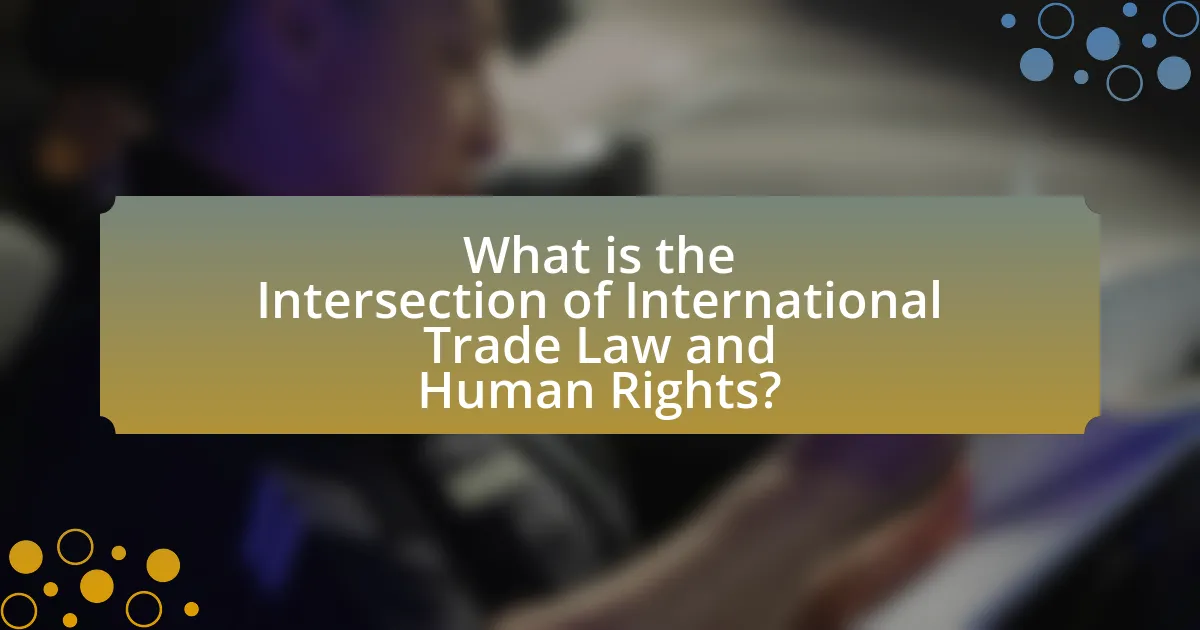
What is the Intersection of International Trade Law and Human Rights?
The intersection of international trade law and human rights involves the ways in which trade agreements and regulations can impact human rights standards and protections. International trade law, which governs trade relations between countries, can either promote or hinder human rights depending on the provisions included in trade agreements. For instance, trade agreements may include labor rights clauses that aim to protect workers’ rights, thereby enhancing human rights. Conversely, trade policies that prioritize economic growth over social welfare can lead to human rights violations, such as exploitation of labor or environmental degradation. This dynamic is evident in various international frameworks, such as the World Trade Organization’s agreements, which have been critiqued for not adequately addressing human rights concerns.
How do International Trade Law and Human Rights interact?
International Trade Law and Human Rights interact through the regulation of trade practices that can impact human rights standards. Trade agreements often include provisions that require adherence to labor rights, environmental protections, and anti-discrimination measures, thereby promoting human rights within the context of international commerce. For instance, the inclusion of labor standards in trade agreements, such as those seen in the North American Free Trade Agreement (NAFTA), aims to ensure that trade does not undermine workers’ rights. Additionally, organizations like the World Trade Organization (WTO) recognize the importance of sustainable development, which encompasses human rights considerations, in their trade policies. This interaction highlights the necessity for trade laws to align with human rights principles to foster equitable and just global trade practices.
What are the key principles of International Trade Law?
The key principles of International Trade Law include non-discrimination, reciprocity, transparency, and the promotion of fair competition. Non-discrimination is exemplified by the Most-Favored-Nation (MFN) principle, which mandates that any favorable trading terms offered to one country must be extended to all other trading partners, as established in Article I of the General Agreement on Tariffs and Trade (GATT). Reciprocity involves mutual concessions between trading nations, ensuring that trade benefits are shared equitably. Transparency requires that trade regulations and practices be openly communicated, allowing for informed participation in international trade, as outlined in Article X of GATT. Lastly, the promotion of fair competition is aimed at preventing unfair trade practices, such as dumping and subsidies, which can distort market dynamics. These principles collectively aim to create a balanced and equitable trading environment, fostering economic cooperation among nations.
What are the fundamental concepts of Human Rights?
The fundamental concepts of Human Rights include universality, inalienability, indivisibility, and equality. Universality asserts that human rights apply to all individuals regardless of nationality, ethnicity, or any other status, as established in the Universal Declaration of Human Rights adopted by the United Nations in 1948. Inalienability means that human rights cannot be taken away or transferred, emphasizing their inherent nature. Indivisibility highlights that all human rights are equally important and interdependent; for instance, the right to life cannot be fully realized without the right to health. Equality ensures that all individuals are entitled to the same rights without discrimination, which is a core principle enshrined in various international treaties, such as the International Covenant on Civil and Political Rights. These concepts form the foundation of international human rights law and guide the protection and promotion of human dignity globally.
Why is the intersection of these fields important?
The intersection of international trade law and human rights is important because it ensures that trade agreements promote social justice and protect fundamental rights. This intersection addresses the potential negative impacts of trade policies on human rights, such as labor exploitation and environmental degradation. For instance, the inclusion of human rights clauses in trade agreements can lead to better labor standards and environmental protections, as seen in the European Union’s trade agreements that incorporate human rights considerations. By aligning trade practices with human rights principles, countries can foster sustainable development and enhance global cooperation, ultimately benefiting both economies and communities.
How does trade impact human rights globally?
Trade significantly impacts human rights globally by influencing labor standards, economic opportunities, and access to resources. For instance, trade agreements often include provisions that can either promote or undermine workers’ rights, depending on the regulations enforced by participating countries. A study by the International Labour Organization (ILO) found that countries with strong trade unions and labor protections tend to have better human rights outcomes, as these organizations advocate for fair wages and safe working conditions. Conversely, trade practices that prioritize profit over people can lead to exploitation, such as child labor and unsafe working environments, particularly in developing nations. Therefore, the nature of trade policies directly correlates with the protection or violation of human rights across different regions.
What are the implications of neglecting human rights in trade agreements?
Neglecting human rights in trade agreements can lead to significant social, economic, and political repercussions. When trade agreements prioritize economic gains over human rights, it often results in the exploitation of workers, environmental degradation, and the perpetuation of inequality. For instance, the 1994 North American Free Trade Agreement (NAFTA) has been criticized for contributing to job losses in the U.S. while failing to protect labor rights in Mexico, leading to increased poverty and social unrest. Furthermore, neglecting human rights can damage a country’s international reputation, resulting in reduced foreign investment and trade opportunities, as seen in cases where countries face sanctions or boycotts due to human rights violations. Thus, the implications of ignoring human rights in trade agreements extend beyond immediate economic benefits, affecting long-term stability and ethical governance.
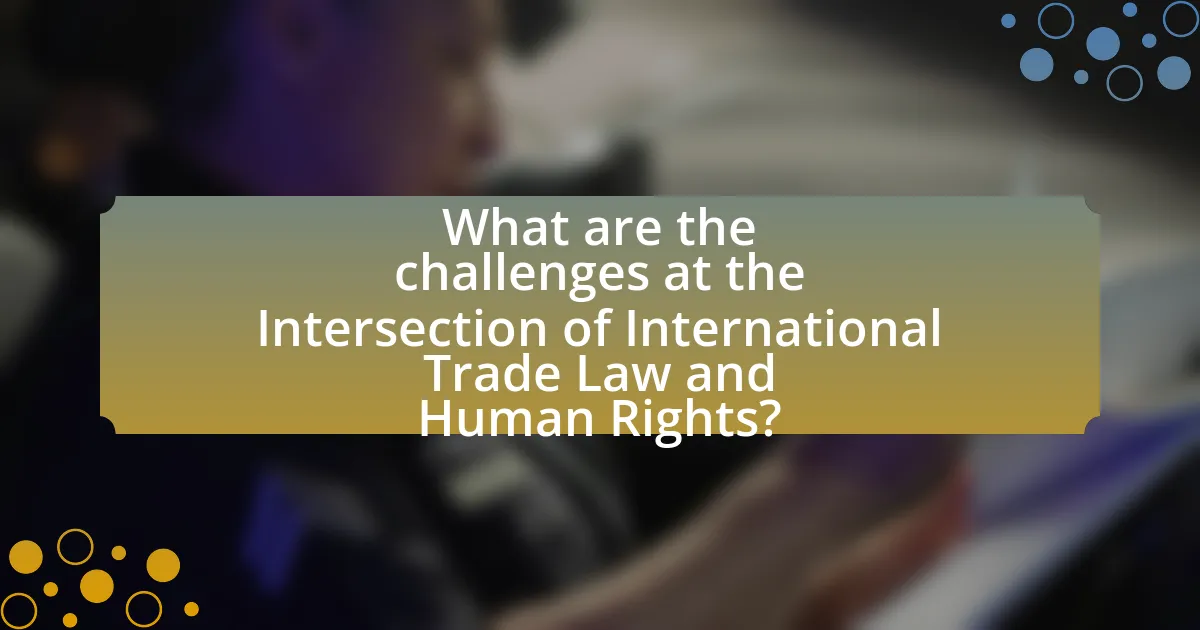
What are the challenges at the Intersection of International Trade Law and Human Rights?
The challenges at the intersection of international trade law and human rights include the prioritization of trade agreements over human rights protections, the lack of enforceable mechanisms for human rights within trade frameworks, and the potential for trade policies to exacerbate inequalities. Trade agreements often focus on economic benefits, sidelining human rights considerations, which can lead to exploitation and violations in labor practices. Additionally, existing international trade laws typically do not incorporate binding human rights obligations, making it difficult to hold corporations accountable for abuses. For instance, the World Trade Organization’s rules do not explicitly address labor rights, which can result in countries prioritizing trade competitiveness over the welfare of workers.
What legal conflicts arise between trade laws and human rights?
Legal conflicts between trade laws and human rights often arise when trade agreements prioritize economic interests over the protection of human rights. For instance, trade laws may facilitate the exploitation of labor in countries with weak labor protections, leading to violations of workers’ rights. A notable example is the North American Free Trade Agreement (NAFTA), which critics argue contributed to labor abuses in Mexico by encouraging companies to relocate to areas with lower labor standards. Additionally, trade sanctions imposed for human rights violations can conflict with international trade obligations, creating tensions between promoting human rights and maintaining trade relationships. These conflicts highlight the challenges of balancing economic growth with the enforcement of human rights standards in global trade.
How do different countries prioritize trade over human rights?
Different countries often prioritize trade over human rights by implementing policies that favor economic partnerships and trade agreements, even when these may conflict with human rights standards. For instance, nations like China and Saudi Arabia engage in extensive trade relationships with Western countries, which sometimes overlook human rights abuses in exchange for economic benefits. The European Union, while promoting human rights, has been criticized for its trade agreements with countries that have poor human rights records, such as Vietnam, where the EU’s trade deal was seen as prioritizing economic growth over labor rights. This trend is evident in the Global Trade and Human Rights report by the United Nations, which highlights that economic interests frequently take precedence over human rights considerations in international relations.
What role do international organizations play in these conflicts?
International organizations play a crucial role in conflicts related to the intersection of international trade law and human rights by facilitating dialogue, providing mediation, and establishing frameworks for compliance. For instance, organizations like the United Nations and the World Trade Organization work to ensure that trade agreements incorporate human rights standards, thereby promoting accountability among member states. Additionally, these organizations often deploy fact-finding missions and issue reports that highlight human rights violations linked to trade practices, such as labor exploitation or environmental degradation. This involvement not only raises awareness but also pressures governments to adhere to international norms, as seen in various cases where trade sanctions were imposed in response to human rights abuses.
How do economic interests influence human rights considerations?
Economic interests significantly influence human rights considerations by prioritizing profit and trade over ethical standards. For instance, countries may overlook human rights violations in nations where they have substantial economic ties, such as trade agreements or investments. A notable example is the relationship between Western countries and China, where economic partnerships often lead to a muted response to issues like labor rights abuses and repression of dissent. This dynamic illustrates how economic motivations can lead to a compromise on human rights advocacy, as nations may choose to maintain favorable economic relations rather than confront human rights violations directly.
What examples illustrate the tension between trade and human rights?
Examples illustrating the tension between trade and human rights include the trade relationships between Western countries and China, particularly regarding labor rights and freedom of expression. For instance, the 2020 U.S. ban on cotton imports from China’s Xinjiang region was enacted due to concerns over forced labor practices affecting Uyghur Muslims, highlighting the conflict between economic interests and human rights advocacy. Additionally, the European Union’s trade agreements with countries like Vietnam have faced criticism for potentially undermining labor rights protections, as these agreements prioritize economic benefits over the enforcement of human rights standards. These instances demonstrate how trade policies can conflict with the promotion and protection of human rights.
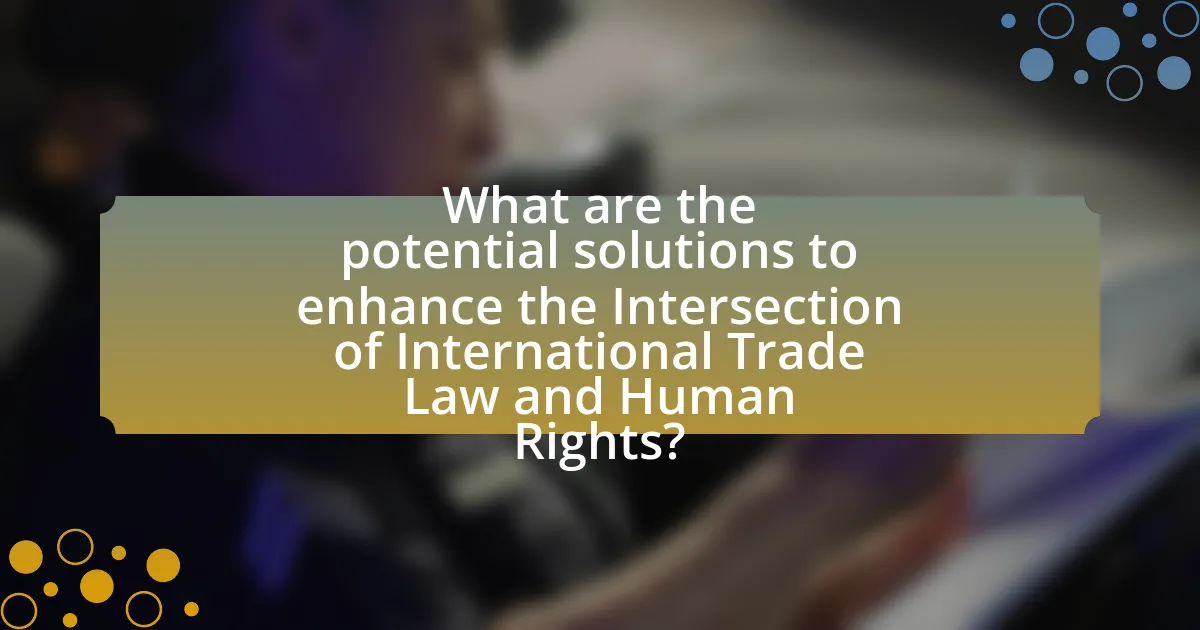
What are the potential solutions to enhance the Intersection of International Trade Law and Human Rights?
Potential solutions to enhance the intersection of international trade law and human rights include integrating human rights assessments into trade agreements, establishing binding human rights clauses, and promoting corporate social responsibility standards. Integrating human rights assessments ensures that trade policies consider their impact on human rights, as seen in the European Union’s approach to trade agreements that include human rights evaluations. Establishing binding human rights clauses in trade agreements can hold countries accountable for human rights violations, similar to the provisions in the Comprehensive and Progressive Agreement for Trans-Pacific Partnership. Promoting corporate social responsibility standards encourages businesses to adhere to human rights principles, as evidenced by the UN Guiding Principles on Business and Human Rights, which provide a framework for companies to respect human rights in their operations.
How can trade agreements incorporate human rights protections?
Trade agreements can incorporate human rights protections by including specific clauses that mandate adherence to international human rights standards. These clauses can require signatory countries to uphold labor rights, prohibit child labor, and ensure non-discrimination in the workplace. For instance, the United States-Mexico-Canada Agreement (USMCA) includes provisions that protect workers’ rights and promote fair labor practices, reflecting a commitment to human rights within trade frameworks. Additionally, monitoring mechanisms can be established to ensure compliance, allowing for the enforcement of these protections through trade sanctions or dispute resolution processes. This approach aligns trade policies with human rights obligations, fostering accountability among participating nations.
What best practices exist for integrating human rights into trade policy?
Best practices for integrating human rights into trade policy include conducting human rights impact assessments, ensuring stakeholder engagement, and incorporating human rights clauses in trade agreements. Human rights impact assessments evaluate the potential effects of trade policies on human rights, allowing policymakers to identify and mitigate negative impacts. Stakeholder engagement involves consulting affected communities and civil society organizations to gather diverse perspectives and ensure that trade policies reflect human rights considerations. Additionally, incorporating human rights clauses in trade agreements can create binding obligations for countries to uphold human rights standards, as seen in agreements like the EU’s trade agreements that include commitments to labor rights and environmental protections. These practices collectively promote accountability and ensure that trade policies align with human rights principles.
How can stakeholders advocate for human rights in trade negotiations?
Stakeholders can advocate for human rights in trade negotiations by actively engaging in the negotiation process, ensuring that human rights considerations are integrated into trade agreements. This can be achieved through lobbying efforts, public campaigns, and collaboration with civil society organizations to raise awareness about human rights issues related to trade. For instance, the inclusion of labor rights provisions in trade agreements, as seen in the United States-Mexico-Canada Agreement (USMCA), demonstrates how stakeholders can influence negotiations to prioritize human rights. Additionally, stakeholders can utilize platforms such as the World Trade Organization (WTO) to voice concerns and push for accountability mechanisms that enforce human rights standards within trade frameworks.
What role does public awareness play in promoting human rights in trade?
Public awareness plays a crucial role in promoting human rights in trade by influencing consumer behavior and pressuring corporations and governments to adopt ethical practices. When the public is informed about human rights violations linked to trade, such as labor exploitation or environmental degradation, they are more likely to support businesses that prioritize ethical sourcing and fair labor practices. For instance, campaigns like the Fair Trade movement have successfully raised awareness about the importance of equitable trade practices, leading to increased consumer demand for products that adhere to human rights standards. This heightened awareness can result in legislative changes and corporate accountability, as companies strive to align with public expectations and avoid reputational damage.
How can consumers influence trade practices regarding human rights?
Consumers can influence trade practices regarding human rights by exercising their purchasing power to support ethically produced goods and services. When consumers prioritize products from companies that adhere to human rights standards, they create market demand for ethical practices. This demand can compel businesses to adopt fair labor practices, improve working conditions, and ensure supply chain transparency. For instance, a 2020 survey by the Global Consumer Insights found that 66% of global consumers are willing to pay more for sustainable brands, demonstrating that consumer preferences can drive companies to align their operations with human rights principles.
What are the best practices for ensuring human rights in international trade?
The best practices for ensuring human rights in international trade include implementing robust due diligence processes, promoting transparency, and fostering stakeholder engagement. Companies and governments should conduct thorough assessments of their supply chains to identify and mitigate human rights risks, as evidenced by the UN Guiding Principles on Business and Human Rights, which emphasize the responsibility of businesses to respect human rights. Additionally, trade agreements should incorporate human rights clauses to hold parties accountable, as seen in the European Union’s trade agreements that include commitments to uphold labor rights. Regular monitoring and reporting mechanisms are essential to ensure compliance and address violations effectively.
